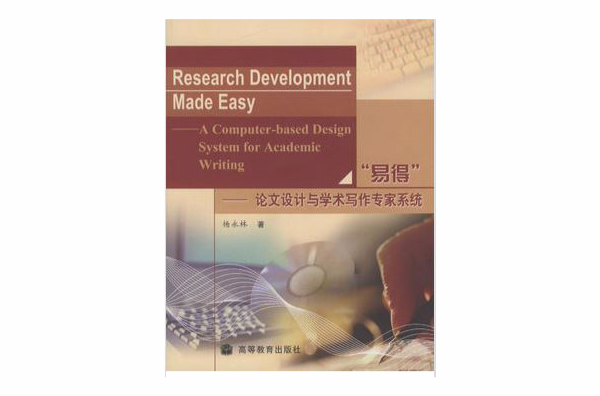《易得:論文設計與學術寫作專家系統》是2005年由高等教育出版社出版的圖書
基本介紹
- 書名:易得:論文設計與學術寫作專家系統
- ISBN:7040139324
- 出版社:高等教育出版社
- 開本:16
圖書信息,內容簡介,目錄,
圖書信息
出版社: 高等教育出版社; 第1版 (2005年8月1日)
平裝: 283頁
正文語種: 英語
開本: 16
ISBN: 7040139324
條形碼: 9787040139327
尺寸: 24.3 x 18.6 x 1.4 cm
重量: 499 g
內容簡介
《易得:論文設計與學術寫作專家系統》講述了:90世紀90年代以來,隨著世界經濟一體化、科學技術全球化、技術人才國際化、信息技術產業化、文本信息數位化、學術成果網路化進程的加快,英語寫作在外語學習中的重要地位,不斷得以提升,逐漸成為評價學習者個體語言能力水平的一個必要參數,普遍得到認可。考察外語評估體系的演變過程,更能說明問題:一個顯而易見的事實是,能否客觀科學、準確全面地評估學習者的寫作水平,不但已經成為國際三大英語測試體系(即GRE、TOEFL,以及IELTS)所關注的重要內容,同時也是國內“大學英語四、六級考試”、“英語專業四、八級考試”所面臨的一項重要改革內容。譬如,美國的“托福”(TOEFL)考試,原來沒有寫作,後來增加了英語寫作考試的內容。英國和澳大利亞共同開發的“雅思”(IELTS)考試,一直重視英語寫作能力,使其成為語言整體評估體系中的一個不可或缺的重要參數,同時也成為這一考試系統中體現人性化特色的一個顯著標誌,深受考生的歡迎。近年來,“美國研究生入學考試”(GRE)也在不斷增加寫作能力在其評估體系中的權重,通過“分析性寫作”(Analytical Writing)的引入,更為科學合理地考查考生通過英語寫作解決實際問題的能力水平。
目錄
PREFACE前言
CHAPTER ONE:Introduction to the RD System系統簡介
PREVIEW內容介紹
FRAMEWORK OF INTRODUCTION TEXT框架結構
1.What Are Major Problems and Possible Solutions in Rrsearch Development&Academic Writing?問題與對策
2.What Unique Features Does the RD System Possess?系統特徵
3.How Can You USC the RD System and Make Your Rresearch Work Easier?科研幫手
4.What Tips Can Help You Deepen Your Understanding of the RD System?“易得”攻略
A mini?lecture:Research Development Made Easy研發利器
CHAPTER TWO:How Can You Produce a Pre?text?文前文本
PREVIEW內容介紹
FRAMEWORK OF PRE-TEXT框架結構
1. Cover Sheet封面形式
1.1 Why do you need a cover sheet?
1.2 What does a cover sheet look like?
1.3 How can you use the RD system to complete a cover sheet?
2.Acknowledgements致謝內容
2.1 Why do you need an acknOwIedgemenl part?
2.2 What does an acknOwIedgemenl part look like?
2.3 How can you use the RD system to produce an acknOwIedgemenl part?
3.Abstract論文摘要
3.1 Why do you need an abstract?
3.2 What does an abstract look like?
3.3 How can you use the EAME system to write an abstract?
3.4 What tips can help you further improve your abstract writing?
A mini-lecture:An Electronic Abstract Made Easy System“易覓”軟體
4. Table of Contents全文目錄
4.1 Why do you need a table of contents?
4.2 What does a table of contents look like?
4.3 How can you use the RD system to create a table of contents?
5. List of Figures and Tables圖表目錄
5.1 Why do you need a list of figures and tables?
5.2 What does a list of figures and tables look like?
5.3 How can you use the RD system to make a list of figures and tables?
5.4 What tips can help you improve your figure and table listing?
A mini-lecture:Some Universal Principles for the Development of a Meticulous Style in Research求精原則
6.List of Abbreviations縮略語表
6.1 Why do you need a list of abbreviations?
6.2 What does a list of abbreviations look like?
6.3 How can you use the RD system to produce a list of abbreviations?
CHAPTER THREE:How Can You Complete a Text Proper?正文文本
PREVIEW內容介紹
FRAMEWORK OF TEXT PROPER框架結構
1. Topic Selection研究選題
1.1 Why do you need topic selection training?
1.2 What factors do you need to consider in your topic selection?
1.3 How can you use lhe RD system to solve problems in your topic selection?
2.Title Elaboration破題立論
2.1 Why do you need title elaboration?
2.2 What factors do you need to consider in your title elaboration?
2.3 How can you use the RD system to solve some problems in your title elaboration?
2.4 What tips can help you further improve your title elaboration?
A mini-lecture:How to Choose a Good Title for Your Piece?美名薦佳文
3. Research Introduction/Background Information背景介紹
3.1 Reseamh Motives研究動機
3.2 Literature Review文獻綜述
A mini-lecture:In What Ways Can We Review?評議之文
3.3 Existing Problems存在問題
3.4 Research Focuses,Questions研究焦點/問題
3.5 Structural Arrangements體例結構
A mini-lecture:From Paragraph to Text段落篇章
4. Theoretic Framework理論框架
4.1 Why do you need to construct a framework?
4.2 What factors do you need to consider in your theory construction?
4.3 How can you use fhe RD system and solve some problems in setting up your theoretical framework?
4.4 What tips can help you improve your theory construction?
A mini-lecture:Categorization and Scientific Research科學分類
5. Methodology Selection方法選擇
5.1 Why do you need to select your research methods?
5.2 What factors do you need to consider in your methodology selection?
5.3 How can you use the RD system to solve some problems in your methodology selection?
5.4 What tips can help you improve your methodology selection?
A mini-lecture:Methodological Innovation and Talent Studies人才學研究應當注重方法的創新
6. Data Collection數據收集
6.1 Why do you need to collect data?
6.2 What factors do you need to consider in your data collection?
6.3 How can you use the RD system to solve some problems in your data collection?
7. Analysis分析研究
7.1 Why do you need analysis?
7.2 What factors do you need to consider in your analysis?
7.3 How can you use the RD system to solve some problems in your analysis Darl?
8. Discussion討論展示
8.1 Why do you need to introduce a discussion?
8.2 What factors do you need to consider in your discussion?
8.3 How can you use the RD system to solve some problems in your discussion organization?
9. Conclusion所得結論
9.1 Why do you need to include a conclusion?
9.2 What factors do you need to consider in your conclusion?
9.3 How can you use the RD system to solve some problems in making your conclusions?
CHAPTER FOUR:How Can You Provide a Post-text?文後文本
PREVIEW內容介紹
FRAMEWORK OF POST-TEXT框架結構
1. References參考書目
1.1 Why do you need to include a list of references?
1.2 What factors do you need to consider in completing your references?
1.3 How can you use the RD system to solve some problems in your reference preparation?
1.4 What tips can help you improve your reference preparation?
A mini-lecture:What Makes a Good Reference Part?參考書目要素
2. Appendixes附錄部分
2.1 Why do you need to have an appendix Oarl?
2.2 What factors do you need to consider in your appendix Darl?
2.3 How can you use the RD system to solve problems in your appendix preparation?
APPENDIX附錄
A Key-word Database for the Teaching of English Writing&Rearch英語寫作教學與研究關鍵字庫
REFERENCES參考書目

